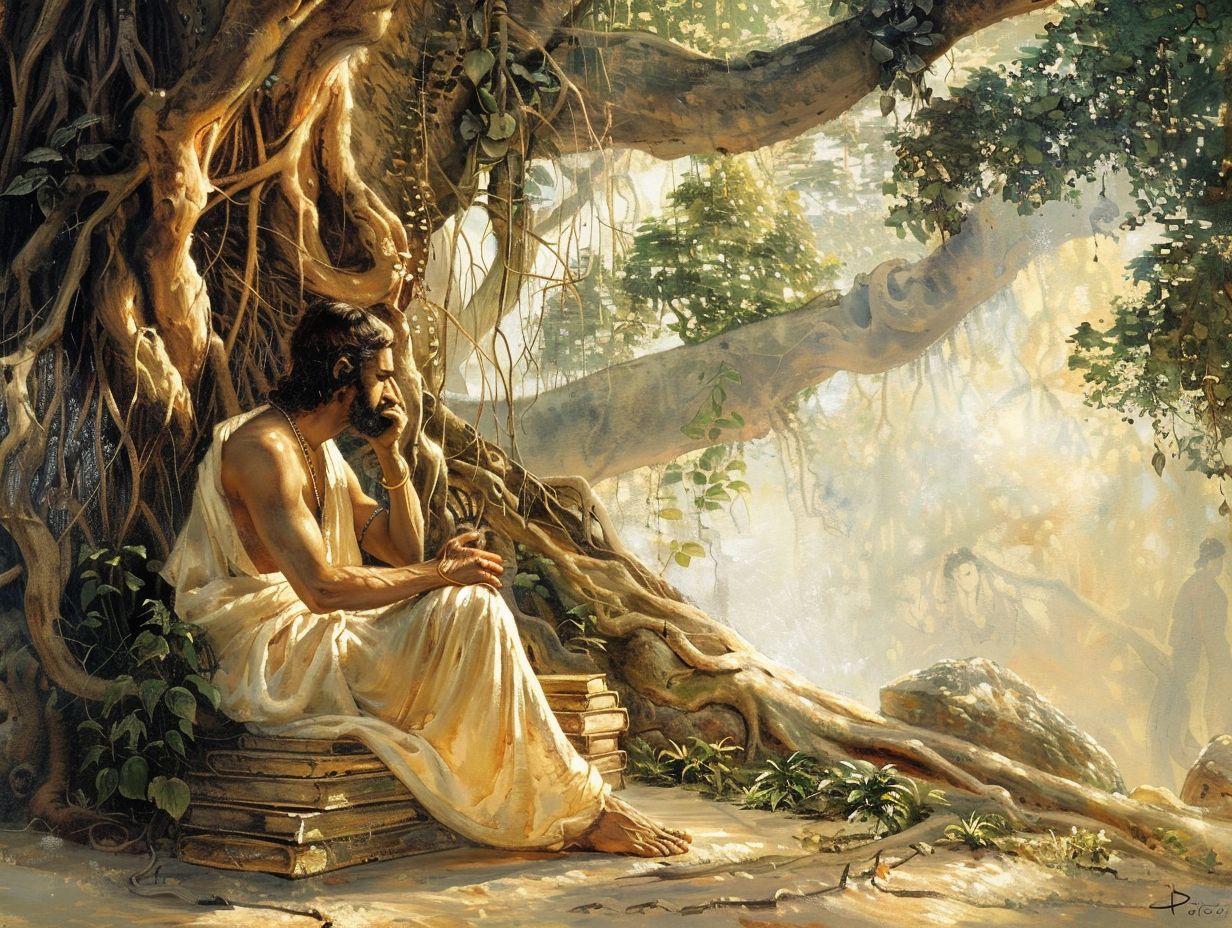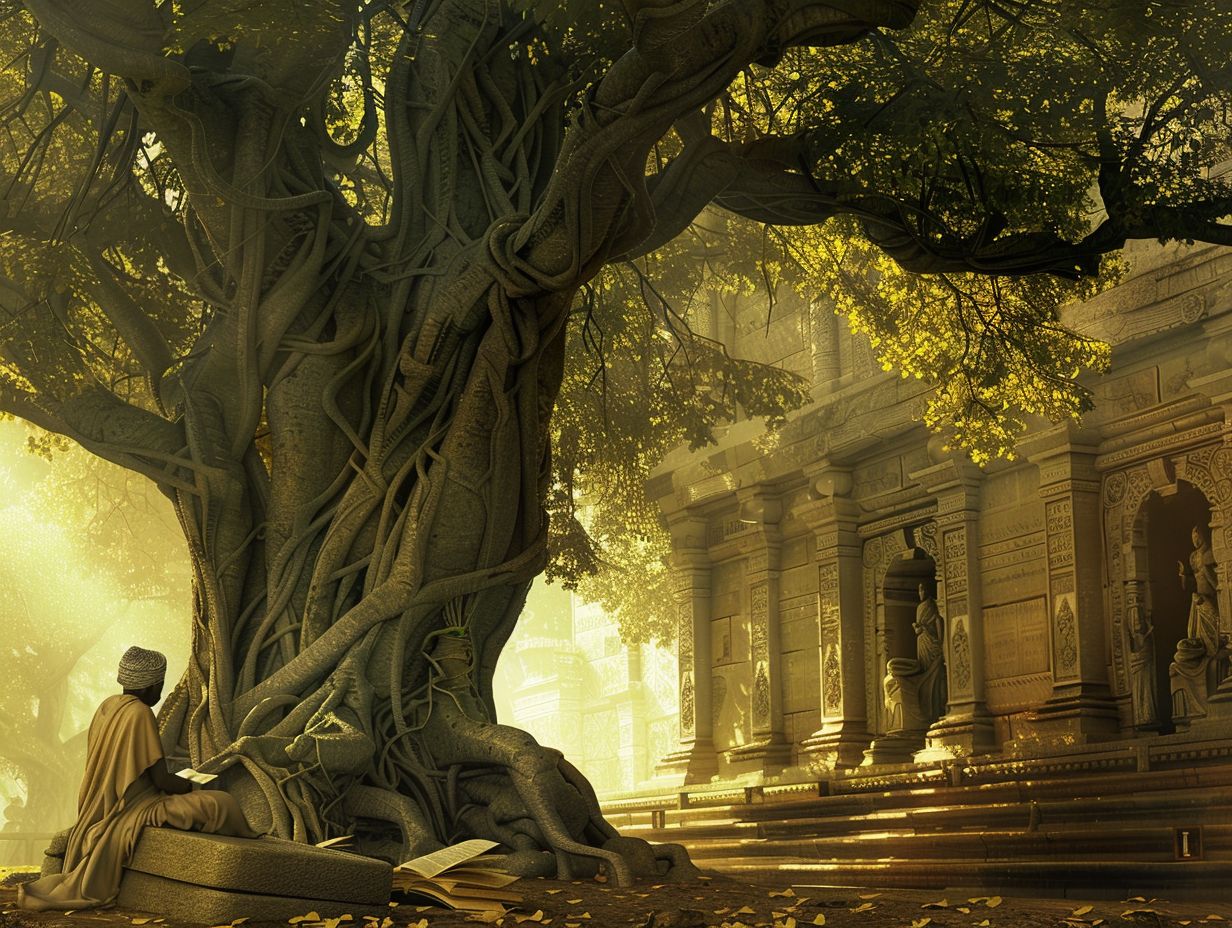Materialism in Charvaka Philosophy
Materialism, a concept frequently linked to the elevation of physical substance over spiritual beliefs, assumes a distinctive character within Charvaka philosophy. This ancient Indian school of thought boldly contests traditional perspectives by outrightly rejecting the concepts of an afterlife and reincarnation, placing a strong emphasis on sensory perception as the exclusive source of knowledge.
A thorough examination of Charvaka s materialism reveals its key principles, the criticisms it has faced, and its enduring influence on Indian society. This exploration offers insights into how Charvaka philosophy redefines perceptions of reality and pleasure, ultimately enriching our understanding of these fundamental aspects of human experience.
What is Materialism?

Materialism stands as a philosophical doctrine that posits the material world as the primary reality, asserting that all that exists is either composed of matter or reliant on material interactions. This worldview carries significant implications across diverse fields, including ethics, epistemology, and the philosophy of mind, where it challenges conventional ideas regarding existence, consciousness, and the quest for happiness.
Grounded in empirical evidence, materialism champions a reliance on sensory perception and rational inquiry, thus shaping contemporary philosophical discourse and offering robust critiques of dualism, idealism, and supernaturalism.
How Does Charvaka Philosophy View Materialism?
Charvaka philosophy, an ancient Indian philosophical tradition, offers a distinctive interpretation of materialism, marked by its atheistic viewpoints and a resolute dismissal of supernaturalism. Advocating for a hedonistic approach to life, Charvaka underscores the importance of sensory experience as the sole legitimate source of knowledge, thereby challenging conventional beliefs surrounding the soul, the afterlife, and moral constructs.
By prioritizing empirical evidence and human experience over abstract ideas regarding existence and consciousness, Charvaka presents a pragmatic worldview that rigorously critiques religious dogmas and metaphysical assertions.
1. Rejection of Afterlife and Reincarnation
A pivotal aspect of Charvaka philosophy lies in its unequivocal rejection of the concepts of afterlife and reincarnation, asserting that such beliefs lack empirical evidence and are fundamentally unfounded. This perspective stands in stark contrast to widely accepted views within numerous Indian philosophical traditions, which typically embrace notions of karma and the spiritual existence that transcends death.
The materialistic viewpoint of Charvaka suggests that existence is strictly confined to the material realm, underscoring the significance of the present life and the tangible experiences that accompany it.
By dismissing these metaphysical constructs, Charvaka philosophy introduces critical ethical considerations regarding individual perceptions of responsibility and the consequences of actions. In a framework devoid of an afterlife, moral decisions are shaped by immediate social implications and the pursuit of present happiness. This shift compels a reevaluation of prevailing social constructs, prompting individuals to scrutinize inherited beliefs concerning duty, righteousness, and the very nature of reality itself.
Consequently, the examination of ethical behavior becomes intricately intertwined with the material and observable, encouraging a reassessment of values that have traditionally extended beyond the confines of physical existence.
2. Emphasis on Sensory Perception
In Charvaka philosophy, sensory perception is esteemed as the exclusive source of valid knowledge, fundamentally shaping its materialistic approach to understanding reality. This steadfast reliance on empirical evidence marks a pronounced departure from metaphysical philosophies that depend on abstract reasoning or introspection to elucidate existence. Charvaka’s emphasis on direct experience reinforces its dedication to a pragmatic worldview, where knowledge emerges from tangible interactions with the material world.
This commitment necessitates a reevaluation of how knowledge is constructed and understood, particularly within the realms of the philosophy of mind and epistemology. By prioritizing empirical observations, advocates of this philosophy not only question the validity of unseen phenomena but also illuminate the intrinsic limitations of purely rational thought.
As a result, their stance encourages a deeper exploration of how sensory engagement can foster a more grounded understanding of consciousness, prompting scholars to consider the implications of a materialist framework that perceives the mind as an extension of physical experience, rather than as an independent entity. This paradigm shift cultivates a sophisticated dialogue about the relationship between subjective experience and objective reality.
3. Criticism of Religious Beliefs
The Charvaka philosophy stands out for its incisive critique of religious beliefs, often regarding them as unfounded constructs that hinder the quest for empirical knowledge and ethical living. This perspective aligns seamlessly with its atheistic stance, as Charvaka champions rational inquiry over blind faith, rigorously challenging the validity of spiritual claims and rituals that lack a foundation in observable reality.
By fostering skepticism toward religious doctrines, Charvaka advocates for a more autonomous moral philosophy that prioritizes human experience and practical ethics.
In this context, the importance of such criticism transcends mere rejection of spirituality; it emerges as a crucial element in the ongoing dialogue between materialism and the ethical dimensions of belief systems within Indian philosophy. By scrutinizing the ethical principles underlying spiritual practices, Charvaka not only underscores the potential disjunction between faith and rational thought but also encourages a profound reflection on moral values that arise from lived experiences.
This synthesis of skepticism and ethics invites individuals to critically evaluate the motivations and repercussions of their beliefs, ultimately promoting a more nuanced understanding of existence that harmonizes both material concerns and spiritual inquiries.
Key Concepts in Charvaka Materialism
Charvaka materialism is founded on several pivotal concepts that fundamentally shape its philosophical perspective. Notably, it posits that perception is the sole legitimate source of knowledge, asserts that matter is the essence of ultimate reality, and maintains that pleasure serves as the paramount goal of human existence.
These principles converge to create a unique ethical framework that elevates experiential knowledge and the pursuit of happiness, endorsing a lifestyle that values immediate gratification and tangible rewards over abstract ideals.
1. Perception is the Only Source of Knowledge

In the Charvaka worldview, the assertion that perception is the sole source of knowledge stands as a fundamental pillar of its materialistic philosophy, unequivocally dismissing any form of knowledge that lacks substantiation through direct sensory experience. This perspective emphasizes an unwavering commitment to empirical evidence, positioning Charvaka in stark contrast to philosophical doctrines that depend on intuition or abstract reasoning as foundations for knowledge.
By advocating a skeptical stance towards unverifiable claims, Charvaka establishes a framework for rational discourse that elevates observable reality above all else.
This insistence on tangible evidence prompts a profound reevaluation of the very nature of knowledge, suggesting that other philosophical frameworks particularly those addressing metaphysics and ethics may be fundamentally flawed if they diverge from empirical grounding. The ramifications of this viewpoint extend into discussions surrounding consciousness, proposing that mental states are intrinsically linked to material conditions that can be empirically observed rather than merely speculated upon.
Through this materialistic lens, skepticism towards phenomena such as spirituality and moral absolutes emerges, inviting a critical inquiry into the societal constructs surrounding beliefs that ultimately fail to withstand empirical scrutiny. Thus, the Charvaka perspective not only challenges prevailing paradigms but also inspires a more rigorous examination of what it truly means to possess knowledge.
2. Matter is the Ultimate Reality
At the core of Charvaka materialism is the assertive claim that matter constitutes the ultimate reality, positing that everything in existence is simply a manifestation of physical substances and their interactions. This ontological stance stands in stark contrast to metaphysical perspectives that advocate for the existence of non-material entities, such as the soul or spirit, which Charvaka views as mere illusions. By focusing the discourse on the material world, Charvaka fosters an understanding of life that is firmly anchored in the tangible and measurable aspects of existence.
This foundational belief profoundly influences various metaphysical debates by challenging conventional theories surrounding consciousness and the very nature of existence. By dismissing the idea of immaterial existence, Charvaka stimulates a deeper inquiry into how consciousness emerges from physical processes rather than from an abstract essence. This materialist approach asserts that mental states are intricately interconnected with bodily functions, paving the way for a more empirical examination of human experience.
Thus, the Charvaka framework not only transforms discussions related to ontology but also prompts a critical evaluation of the implications of acknowledging only what can be observed. This perspective ultimately shapes ethical considerations and influences one’s comprehension of the self in relation to the broader universe.
3. Pleasure is the Ultimate Goal
Within the framework of Charvaka philosophy, pleasure is regarded as the paramount goal of human existence, fostering a hedonistic perspective that places the pursuit of happiness above all else. This ethical paradigm posits that indulging in sensory experiences is not only acceptable but essential for a life well-lived.
By elevating pleasure as its guiding principle, Charvaka boldly challenges conventional ethical notions that prioritize asceticism or self-denial, advocating instead for a lifestyle that fully embraces the joys of existence within the material world.
This unabashed quest for pleasure raises significant questions about its implications for broader societal norms and ethical decision-making. When happiness is equated solely with material gratification and sensory indulgence, the perils of consumerism and fleeting satisfaction become evident, potentially leading individuals to favor ephemeral pleasures over long-term well-being or communal values.
As a result, the embrace of hedonism demands a thorough re-evaluation of moral frameworks, as it may cultivate values that lack depth, thereby weakening commitments to altruism and social responsibility. Ultimately, it becomes essential to consider how this philosophy not only informs personal fulfillment but also shapes collective attitudes toward happiness, ethics, and the overarching definitions of a meaningful life.
Criticism of Charvaka Materialism
Despite its profound contributions to Indian philosophy, Charvaka materialism encounters considerable criticism, particularly concerning its perceived absence of spiritual and moral values. Detractors contend that this materialistic viewpoint overlooks the complexities of human consciousness and the potential importance of subjective experiences.
They argue that an excessive focus on empirical evidence may result in a diminished comprehension of the human condition. This critique underscores a wider philosophical dialogue regarding the relationship between materialism and the realms of ethics, spirituality, and the inquiry into existential questions.
1. Lack of Spiritual and Moral Values
One of the primary criticisms leveled against Charvaka materialism is its perceived deficiency in spiritual and moral values, raising pertinent questions about the ethical implications of a purely materialistic perspective.
This critique underscores a significant challenge in contemporary ethical discourse, particularly as an increasingly individualistic society may gravitate toward the pursuit of pleasure without adequately considering the repercussions of such beliefs on communal well-being. As critics delve deeper into this philosophy, they emphasize that the endorsement of a hedonistic lifestyle can erode communal bonds and moral responsibilities, thereby cultivating an environment where self-interest takes precedence over collective values.
This dilemma invites a more expansive discussion regarding how societies conceptualize morality and ethics, prompting a thoughtful examination of whether a foundation solely anchored in material satisfaction can genuinely uphold the moral fabric essential for harmony and cooperation within communities.
2. Ignorance of the Role of Consciousness
Another prominent criticism of Charvaka materialism is its perceived disregard for the role of consciousness, which many assert is fundamental to grasping the nuances of the human experience. Detractors argue that by concentrating exclusively on material phenomena, Charvaka overlooks the intricacies of consciousness and its significant implications for knowledge, perception, and moral reasoning.
This critique suggests that a thorough philosophical inquiry must encompass the subjective experience of consciousness, as it profoundly influences individual understanding and ethical considerations within a broader existential context.
This discussion invites a more profound exploration of the intersection between materialism and consciousness, particularly regarding questions of existence and reality. The implications extend beyond merely dismissing subjective experience; they challenge the very foundation of materialist paradigms by questioning whether a comprehension of the physical world suffices to capture the complexities of human thought, emotions, and morality.
In the realm of philosophical discourse, this tension encourages a reevaluation of materialist perspectives, urging scholars to contemplate whether an integrated approach one that acknowledges both the material and immaterial dimensions of human existence can provide a more profound understanding of what it means to exist as conscious beings.
3. Rejection of Spiritual Experiences

The outright rejection of spiritual experiences represents a contentious aspect of Charvaka materialism, inviting criticism from various philosophical perspectives that emphasize the significance of spirituality in human life. This stance not only provokes inquiries into personal beliefs but also challenges existing societal norms that often intertwine spirituality with morality and purpose.
By dismissing the importance of these experiences, Charvaka’s viewpoint emerges as a critique of deeply ingrained cultural practices that prioritize spiritual growth and introspection. This, in turn, fuels an ongoing debate regarding the role of spirituality in shaping identity and values, prompting many to contemplate whether true fulfillment can be attained through a purely materialistic lens.
Proponents of spiritual practices argue that such experiences nurture a sense of community and interconnectedness essential elements for the cultivation of empathetic societies. This perspective advocates for a more inclusive approach to understanding human existence, one that honors the complexity of both belief systems.
Impact of Charvaka Materialism on Indian Society
Charvaka materialism has significantly shaped Indian society, influencing a range of materialistic schools of thought and sparking critical debates within the expansive realm of Indian philosophy. Its strong emphasis on empirical evidence and skepticism towards religious doctrines has prompted a thorough re-evaluation of traditional values and ethical frameworks, directly challenging the preeminence of spiritual philosophies.
Consequently, the teachings of Charvaka maintain their relevance in contemporary discourse, providing a robust framework for examining their significance today and contributing to the ongoing dialogue in philosophical discussions.
1. Influence on Indian Materialistic Schools of Thought
Charvaka materialism has profoundly shaped various Indian materialistic schools of thought, intricately influencing their philosophical frameworks and ethical perspectives. By prioritizing empirical evidence and sensory perception as the cornerstone of knowledge, Charvaka laid the groundwork that encouraged subsequent thinkers to critically reassess traditional metaphysical beliefs, leading them to adopt a more grounded approach to understanding existence.
This profound influence is apparent in the works of later philosophers who weave materialistic principles into their explorations of the intricate relationship between ethics and human experience.
Among these philosophical traditions, the Jain doctrine, while primarily non-materialistic, displays a nuanced engagement with Charvaka’s concepts, particularly in its rejection of absolute truths. Similarly, the Buddhist focus on the impermanence of all phenomena resonates with Charvaka’s skepticism toward eternalism, creating a rich, contrasting yet interconnected philosophical dialogue.
In these exchanges, the materialistic tenets introduced by Charvaka encourage a deeper examination of ethical behavior rooted in sensory experiences, prompting other schools to either integrate or challenge these beliefs, thereby enriching the complex tapestry of Indian philosophy.
2. Criticism and Debate in Indian Philosophy
The introduction of Charvaka materialism into the Indian philosophical landscape has incited significant criticism and debate, prompting thoughtful discussions regarding the validity of its claims and their implications for ethical living. Many traditional thinkers have contested Charvaka’s dismissal of spiritualism, asserting that a purely materialistic perspective fails to encapsulate the complexities of human consciousness and moral values. This ongoing discourse underscores the dynamic nature of Indian philosophy, wherein contrasting views coexist and enrich philosophical inquiry.
Prominent figures such as Adi Shankaracharya and Dharmakirti have articulated their opposition, emphasizing the significance of metaphysical dimensions that inform ethical behavior and human purpose. They contend that an exclusively empirical view overlooks the profound questions of existence, ultimately leading to existential nihilism. Critics often highlight the necessity of metaphysics for meaningful engagement with morality, suggesting that without such a framework, the intricacies of life can result in a barren understanding of human experiences.
These spirited debates not only illuminate the core tenets of Charvaka materialism but also lay the groundwork for further philosophical exploration within the realms of ethics and existence.
3. Relevance in Modern Society
In contemporary society, the significance of Charvaka materialism endures, echoing modern humanist ideals that emphasize empirical evidence and experiential knowledge as essential tools for understanding the human condition. This philosophical perspective invites individuals to scrutinize traditional beliefs and engage with ethical dilemmas through the lens of rational inquiry, challenging the status quo and advocating for a pragmatic approach to life.
As societal values continue to evolve, the teachings of Charvaka foster ongoing dialogue about finding a balance between material pursuits and ethical considerations.
Amidst an era characterized by rapid technological advancement and an increasing focus on consumerism, the principles derived from Charvaka prompt a critical examination of what constitutes a meaningful life. This perspective encourages individuals to reflect on the impact of their choices, not only concerning personal well-being but also regarding communal and environmental sustainability.
In a climate where debates surrounding social justice, environmental ethics, and the definition of happiness remain prominent, the Charvaka framework invites a thorough reconsideration of the ethics of materialism, promoting a lifestyle that seeks to harmonize self-interest with the broader human experience.
Frequently Asked Questions
What is materialism in Charvaka Philosophy?

Materialism in Charvaka Philosophy refers to the belief that matter is the only reality and that there is no existence of a soul or afterlife. This philosophy focuses on the pursuit of material pleasures and enjoyment in the present life.
What are the main principles of Charvaka Philosophy?
The main principles of Charvaka Philosophy are: 1) Pramana (perception) is the only way to gain knowledge, 2) Matter is the only reality, 3) Rejection of the existence of God, soul, and afterlife, and 4) Pursuit of pleasure and enjoyment in the present life.
How does Charvaka Philosophy view the pursuit of material pleasures?
Charvaka Philosophy believes that the pursuit of material pleasures is the ultimate goal of life. They reject the concept of renunciation and advocate for indulgence in sensual pleasures as long as it does not harm others.
What are the criticisms of materialism in Charvaka Philosophy?
The main criticisms of materialism in Charvaka Philosophy are: 1) Lack of moral values and ethics as material pleasures are prioritized over virtues, 2) Rejection of any form of higher purpose or meaning in life, and 3) Limiting one’s perspective to only the physical world, neglecting the spiritual aspect of human existence.
How does Charvaka Philosophy view the concept of God?
Charvaka Philosophy completely rejects the existence of God. They believe that the concept of God is created by humans to explain natural phenomena and to maintain social order.
Does Charvaka Philosophy have any impact on modern society?
Yes, the principles of materialism in Charvaka Philosophy can be seen in modern societies where the pursuit of material wealth and pleasures is prioritized over spiritual and moral values. However, this philosophy is also criticized for its lack of balance and neglect of the spiritual aspect of human existence.
